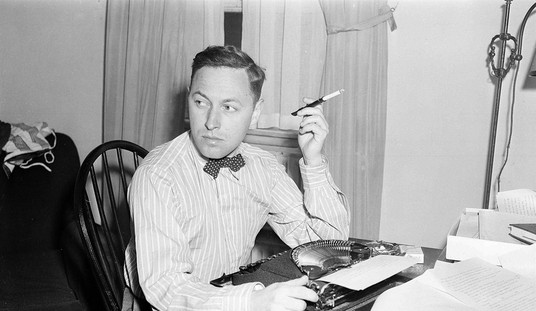In an important book, A Nation of Victims: The Decay of the American Character, which appeared in 1992, Charles Sykes speaks of “victim chic” and deplores its “catalog of immanent grievance and infinite self-assertion.” Sykes quotes former Assistant Education Secretary Chester Finn, who had it exactly right: “In our no-fault society, it is acceptable to be a victim but not to be held responsible for one’s own situation or for that of one’s children.” We have, Sykes argues, torn up the moral contract underwriting “shared middle-class values” and installed a “victimist” ideology in its place, eliminating social distinctions “based on individual success.” We all experience unfairness and injustice, he concludes, “but that does not mean we need to turn them into all-purpose alibis.”
The confirmation of Sykes’ thesis is all around us. It seems as if we now live in societies filled mainly with victims: victims of mainstream culture, victims of exclusionary daycare policies, victims of transfats, victims of the schoolyard game of tag where some poor child is made to feel “it,” victims of secondhand smoke, victims of the tax system, victims of anti-terror laws, victims of those who pose as victims, victims of state lotteries, victims of potentially lethal glass mugs in British pubs, victims of our genes, victims of “puritanism” (i.e., moral propriety), victims of this and victims of that — those who make up what Bruce Thornton in Plagues of the Mind has aptly called “the conga line of victimhood,” to which the nanny state materially contributes.
And this new class of victims is abundantly complemented by an army of “survivors,” cashing in on what they regard as the prestige of those who have experienced real, historical calamities. Once we were content to say, as in the title of a famous poetry collection by D.H. Lawrence, “Look! We have come through,” and leave it at that. Now we are driven to proclaim our newfound status. We are survivors of this phobia or that phobia, survivors of one or another disease, survivors of tenement life, survivors of reality TV shows, survivors of the free market and corporate industry viewed as a great and oppressive structure of domination, survivors of brutal parents, survivors of feral children, survivors of workplace humiliation, survivors of scalding cups of McDonald’s coffee, survivors of what-have-you, all clamoring for attention, recognition, sympathy, and compensation.
But survivors are only victims by another name, for their “survival” depends on the acknowledgment of their suffering, that is, on what we might call an Asclepian concern from those who have not yet joined this therapeutic category. The flaunting of debility is their greatest strength. They own their victimhood and will not be deprived of it. Radio host Larry Elder, author of The Ten Things You Can’t Say In America, has coined the term “victicrats” to apply to African-Americans who profit from the bogey of white guilt, but it could apply equally well to the entire commonality of professional victims who make their living off the cult of entitlement that has sunk its roots deep into the Western psyche. In a culture that has scrapped natural endowments in favor of artificial entitlements, nothing succeeds like failure.
Which compels one to ask, isn’t anybody normal anymore? It seems as if we now live in societies where almost everybody has a right or a claim and practically nobody has a duty or an obligation. “The great escape of our times,” writes Thomas Sowell in Real Clear Politics, “is the escape from personal responsibility for the consequences of one’s own behavior.” It looks increasingly as if we are on the way to becoming our very own third world in which we demand and expect to be heard, to be taken care of, and to receive ample redress for the wrongs we have all suffered, the abuses we have endured, and simply cannot conceive of a world in which we are not coddled and subsidized. Living in a lose-win culture, we revel in our voguish condition as a society of the disabled.
It gets worse. Everyone is innocent, it seems, except those who are prepared to assume responsibility not only for themselves but for their cultural patrimony as well. Despite the superficial differences, it is really the same quivering mindset, the same passion for submission, that governs our behavior in both the domestic and international realms. In the former we regard ourselves as victims of social circumstances before which we protest our helplessness, demanding that the state pay welfare retribution to those who come bandaged with grievances. In the latter, we suffer for the sins of our precursors and implore forgiveness for their evident transgressions, pleading to be shriven by our enemies. For both we and our enemies are regarded as victims of the same tainted past.
It is a subtle discrimination which disguises a real similarity. In the civil dimension, we demand special treatment; in the political domain, we beg forgiveness. These look at first like opposing states of mind. But political atonement for the past “crimes” of our fathers is only the other face of civil reparation for the former “indifference” of the state. In either case, we surrender our independence of will, affirm our innocence before the tribunal of our own self-righteousness, and aspire to a kind of beatification of our motives and purposes. In effect, we are giving up; at the same time, we assert the sanctity of our being and continue to perpetrate an immaculate deception. Whether for the experiences we have undergone in our own lives or for the conduct of our predecessors, we are not responsible.
Nor, in the latter case, are we willing to grant that a civilizing imperative was also at work. President Obama’s orgy of apologies to the world for American political behavior is a salient illustration of this decubital pathology. We must demonstrate our “good faith” and, of course, do everything in our power not to give offense, in this way making amends for what we take to be an exclusively inconsiderate and violent history. As if nothing good ever flowed from the West. As if no other culture or civilization were guilty of colonial depredations. The Metropolitan Museum of Art changing the name of its “Islamic Galleries” to the unwieldy “Arab Lands, Turkey, Iran, Central Asia, and Later South Asia,” as well as its removing three ancient images of Muhammad from its permanent display, is another revealing example of this tendency toward prostration.
Thus, social, political, and economic systems predicated on the autonomy of the person, a robust sense of self, pioneering vigor, exploration in every domain of human endeavor, the principle of a just meritocracy, and even the right to name or represent things accurately are considered ethically suspicious and ideologically opprobrious. Free and contentious democracies, home to a self-reliant and muscular individualism, are anathema to a vast phalanx of oddly aggressive pietists consecrated to an agenda of self-immolation. The only enemies they recognize are those of their fellow citizens who struggle to maintain the core Western values of liberty of thought, speech, and action and who wish to preserve the spirit of accountability for oneself — in other words, those who refuse to claim special dispensation for their personal present or offer apologies for their historical past.
In a fascinating article commenting on the chemical cocktails consumed by the late pop icon Michael Jackson, columnist Sarah Honig writes that the “substances he used to soothe whatever unsettled him weren’t substantially different from the kitschy catchphrases which serve as the proverbial painkillers in our geopolitical reality.” She is referring chiefly to Israel, but her diagnosis is no less true of sociopolitical reality throughout the West. The bromides we ingest to dull our minds, she continues, “are just as common among respectable unthinking denizens in the world’s democracies as prescribed narcotics are in Hollywood. They are just as addictive, no less imbecilic, and every bit as dangerous.”
Honig is on the money, as are Sykes and Thornton and Elder. We have lulled ourselves to sleep with the fashionable tranquillizers of the day, the “facile formulations” of current social and political nonthinking which we use to absolve ourselves of personal responsibility, cultural dignity, and historical conviction. To extend Honig’s Michael Jackson analogy, we are moonwalking backward as an unforgiving future advances with determined tread.










Join the conversation as a VIP Member